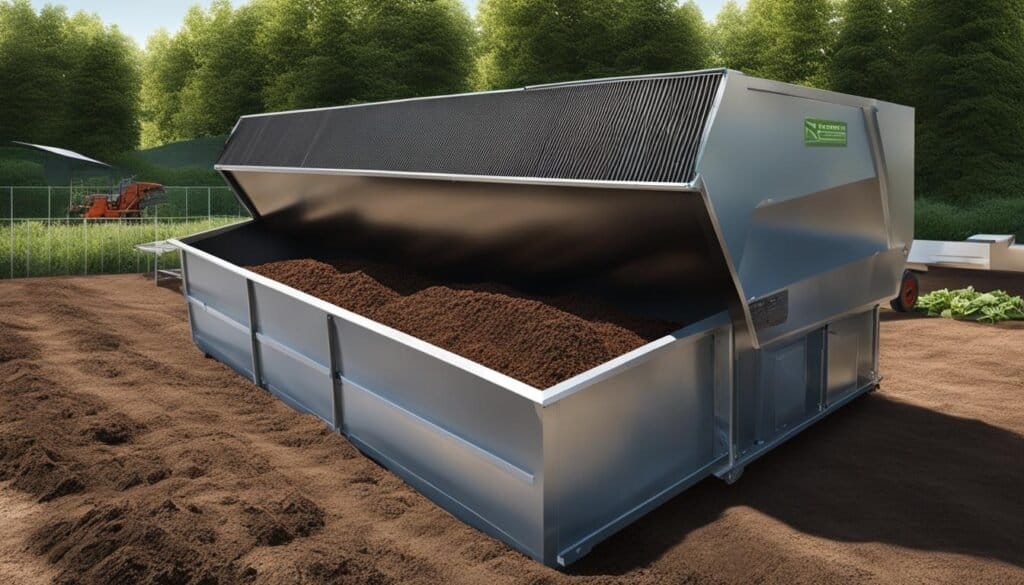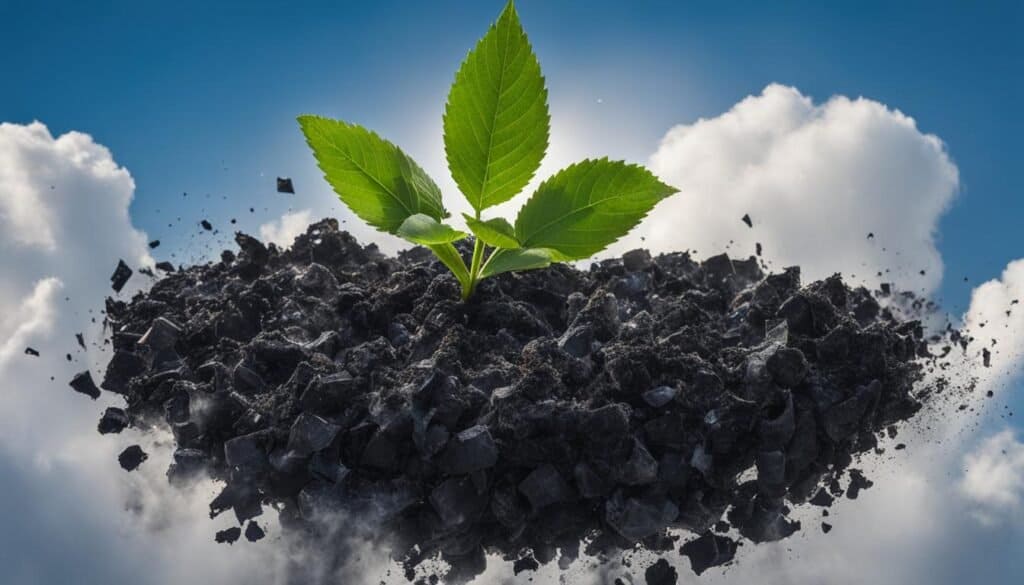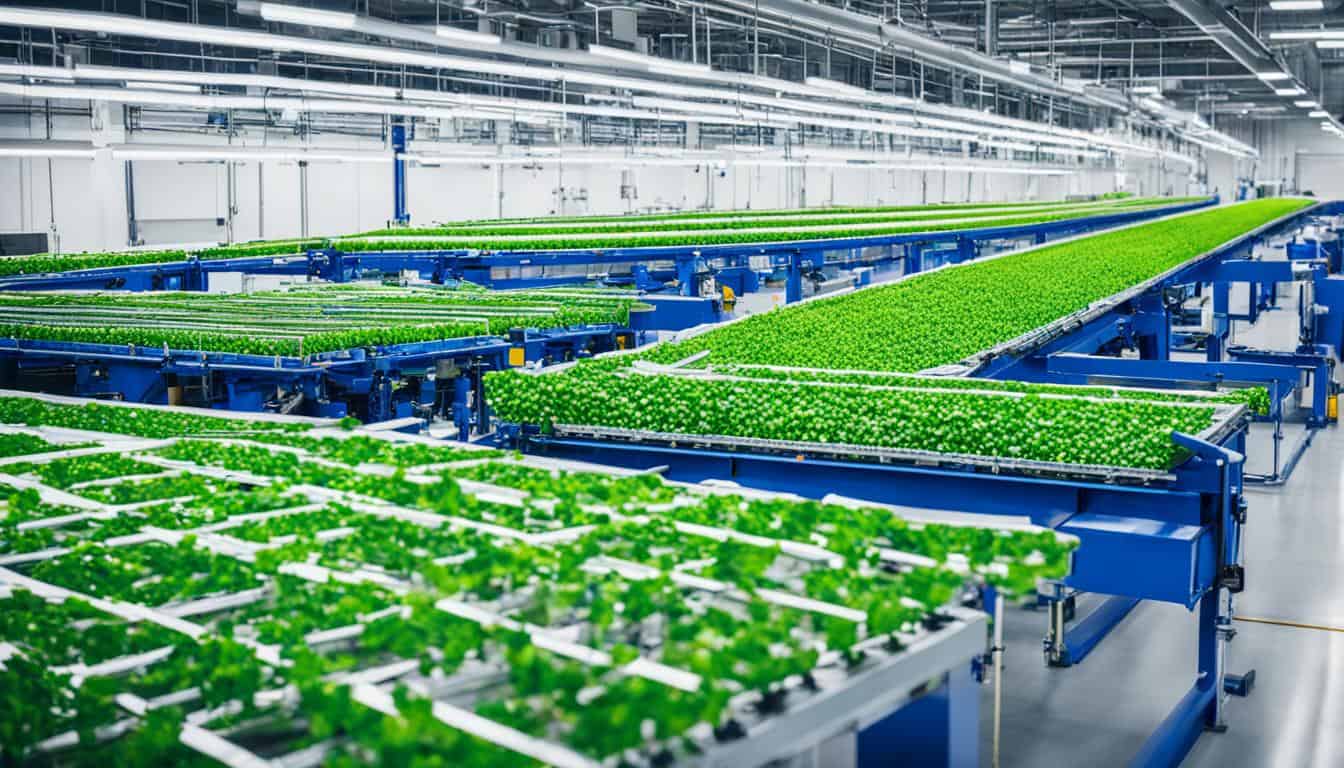In today’s world, solid waste management and recycling occupy a critical position in our efforts to safeguard the environment. The impact of waste reduction on the environment has far-reaching consequences, with key objectives aimed at protecting our surroundings and mitigating the harmful effects of landfill sites, pollution, and greenhouse gas emissions. Ensuring proper waste disposal and promoting sustainable practices are paramount in our endeavours to maintain environmental balance and improve the quality of life for future generations.
Key Takeaways
- Effective solid waste management and recycling are essential in mitigating environmental impacts and promoting sustainability.
- Waste reduction helps decrease the amount of solid waste entering landfill sites, reducing pollution and greenhouse gas emissions.
- Proper waste disposal practices contribute to a healthier planet and resource conservation.
- Recycling technologies and innovations in waste management are instrumental in creating a circular economy and protecting the environment.
- Community involvement and policy implementation play a crucial role in the success of waste management strategies.
- Addressing the challenges of waste reduction and management in urban areas is vital for ensuring a sustainable and healthy environment.
- Environmental sustainability depends on our global commitment to adopt progressive waste strategies and foster ecologically responsible behaviors.
Understanding the Impact of Waste Reduction on Environment
With waste reduction being a key factor in mitigating environmental degradation, it’s essential to comprehend the ways in which solid waste contributes to climate change and resource depletion. In this section, we will explore the greenhouse effect, the carbon footprint of waste handling processes, and the link between waste production and deforestation.
The Greenhouse Effect and Solid Waste
The greenhouse effect is significantly impacted by solid waste management practices. Manufacturing, distribution, usage, and disposal of products result in emissions of greenhouse gases, such as carbon dioxide, methane, and nitrous oxide.
WM (Waste Management): Recycle Right® by following guidelines such as recycling bottles, cans, paper, and cardboard, keeping food and liquids out of recycling, and not using loose plastic bags or bagged recyclables.
These gases contribute to climate change and environmental harm. Solid waste disposal practices, including incineration and landfill decomposition, further exacerbate global warming by increasing greenhouse gas emissions.
Carbon Footprint of Waste Handling Processes
Waste handling processes, such as incineration and landfilling, have a notable carbon footprint due to the emissions released during treatment. Methane emissions from landfills and carbon dioxide from waste incineration contribute to total emissions from waste. As a result, it’s crucial to focus on reducing the carbon footprint through improved solid waste management to mitigate the impact of these processes on the environment.
Deforestation and Resource Depletion from Waste
Waste production plays a significant role in deforestation and resource depletion. As demand for new materials increases, forests and natural resources face greater pressure, leading to environmental degradation. By adopting waste reduction practices, such as recycling paper, we can contribute to conservation efforts and promote sustainability, lessening the strain on our planet’s resources.
The Rising Challenge of Solid Waste in Urban Areas
As urban areas continue to expand and populations swell, the solid waste challenge becomes an increasingly pressing issue. Effective waste management is crucial in mitigating pollution, safeguarding public health, and promoting sustainability. In densely populated municipalities, this calls for the implementation of efficient solid waste strategies that can address a myriad of challenges.
In cities and urban areas, people generate significant volumes of waste, straining the capacity of waste management systems. The sheer scale of urban waste management further complicates the task, requiring an integrated approach that encompasses collection, transport, processing, and disposal methods.
As a result, the primary objectives of waste management in urban settings must consider:
- Pollution control
- Protection of public health
- Sustainability
In light of these challenges, cities and municipalities must prioritize innovative solutions for managing waste, with an emphasis on minimizing environmental impact. This involves exploring various means for recycling, composting, and converting waste into energy.
Effective waste management is vital to the long-term sustainability of urban areas and the well-being of their residents.
Collaboration between local authorities, businesses, and the community is paramount in creating a sustainable waste management system. A collective effort encourages the adoption of environmentally friendly practices by all parties, maximizing our ability to confront the solid waste challenge.
Sustainable Practices in Resource Conservation

Adopting sustainable practices in resource conservation is essential for minimizing waste and contributing to overall environmental sustainability. The 3Rs of waste management—reduce, reuse, and recycle—play a significant role in achieving these objectives. Moreover, technological innovation has led to the development of efficient packaging and product designs that further support waste reduction efforts.
Benefits of the 3Rs: Reduce, Reuse, and Recycle
Embracing the 3Rs—reduce, reuse, and recycle—provides numerous benefits for both the environment and society. By minimizing waste generation, these practices result in:
- Reduced resource extraction
- Lower disposal costs
- Decreased greenhouse gas emissions
- Increase in resource productivity
Furthermore, the 3Rs contribute to the long-term sustainability and environmental health of our planet, encouraging individuals and businesses to shift their focus towards adopting waste reduction practices.
Efficient Packaging and Product Design
Efficient packaging and product design play a critical role in waste reduction. Innovations in this area emphasize the development of recycling-friendly products and waste prevention strategies. Some examples include:
- Lightweight packaging materials
- Biodegradable or compostable packaging
- Modular product designs that allow for easy repair or upgrades
- Products made from recycled materials
These groundbreaking designs directly contribute to waste reduction efforts, aligning with modern waste management policies and the goal of creating a sustainable future.
Advances in Recycling Technologies

Recent years have witnessed remarkable advances in recycling technologies, greatly benefiting the field of sustainable waste management. These innovations have expanded the capabilities to process a wide array of recyclable materials and have driven the adoption of environmentally friendly solutions in waste management practices.
Such technological advancements have led to the development of advanced sorting systems, which use automation and robotics to improve the accuracy and efficiency of recycling processes. These systems ensure proper separation of materials and reduce human intervention, making the recycling process more cost-effective and reliable.
Recycling technologies have come a long way, providing more sustainable waste management solutions and promoting the use of green technology in the industry.
Besides, cutting-edge recycling technologies have been implemented to process challenging materials, such as e-waste and mixed plastics, enabling more effective recycling of these materials and reducing the environmental hazards associated with their disposal. The adoption of innovative biodegradable materials in place of traditional plastics is another milestone towards having a sustainable waste management system.
Lastly, recent innovations have enabled waste conversion into valuable energy resources. Waste-to-energy facilities, for example, generate electricity, heat, and biofuels using the waste that would otherwise end up in landfills, presenting a sustainable approach to waste management.
- Advanced sorting systems.
- Recycling technologies for challenging materials.
- Biodegradable materials.
- Waste-to-energy solutions.
These breakthroughs have revolutionized the waste management sector, leading to the creation of more eco-friendly options and fostering a greener future for our environment. As recycling technologies continue to evolve, we can anticipate further enhancement in sustainable waste management practices, contributing to the conservation of our precious natural resources.
Innovations in Organic Waste Management

As our society strives for sustainability, innovations in organic waste management have emerged with advanced composting techniques that effectively treat biodegradable waste. These groundbreaking practices are integral to waste reduction strategies, creating a circular economy that promotes the conversion of waste into valuable resources while minimizing environmental impacts.
Composting has evolved into an efficient method for managing organic waste, as it facilitates the decomposition process by converting biodegradable waste into nutrient-rich humus. This output can then be utilized as a natural fertilizer for agriculture or horticulture projects, bolstering sustainable practices and reducing the necessity for landfill disposal. Also, composting helps diminish the release of greenhouse gases like methane, that result from decomposing organic waste in landfills.
Composting not only accelerates waste degradation, it also revitalizes soil health and mitigates the contribution of organic waste to methane emissions in landfills.
Sustainable waste management practices like composting denote an eco-friendly shift in handling various waste streams, including food waste, yard waste, and agricultural byproducts. As a pivotal component of sustainable development, innovative organic waste management fosters environmental stewardship while generating opportunities to recycle waste into resourceful materials.
- Home composting systems can be easily implemented, requiring minimal equipment and investment for processing household food waste.
- Large-scale composting facilities serve municipalities, commercial establishments, and agricultural operations, enabling them to manage vast quantities of organic waste.
- Anaerobic digestion complements composting efforts, as it processes organic waste into biogas and biofertilizer, which can then be used as renewable energy and an eco-friendly agricultural input.
Embracing innovative technologies and strategies in organic waste management, like advanced composting techniques, is instrumental in reducing our environmental footprint. These sustainable practices contribute extensively to waste reduction, nurturing the adoption of eco-friendly measures to process biodegradable waste and shape a more sustainable future.
Renewable Energy from Waste
One of the most promising solutions for a sustainable future lies in harnessing renewable energy from waste. Biomass energy conversion technologies, such as anaerobic digestion and gasification, offer a way to transform organic waste into sustainable, alternative fuels; this not only lessens the reliance on fossil fuels but also helps improve environmental quality.
Biomass Energy Conversion
By using biomass energy conversion technologies, we can turn organic waste into valuable sources of renewable energy. Anaerobic digestion, for example, breaks down biodegradable waste in an oxygen-deprived environment, creating methane – a clean and efficient energy source. Another sustainable energy production method is biomass gasification, where organic waste is converted into synthetic gas, or syngas, which can be used for electricity generation and chemical production.
Combining these technologies helps to reduce the potential for pathogens in water systems, thereby contributing to a cleaner and safer environment. Moreover, by converting waste into sustainable energy, we are also putting responsible waste management practices into action.
Reduction in Fossil Fuel Use Through Waste-to-Energy
Waste-to-energy initiatives play a crucial role in the reduction of fossil fuel use and the promotion of sustainable development. By utilizing combustible waste as an alternative energy source, we can generate electricity and heat, reducing our reliance on traditional energy resources. As a result, waste-to-energy plants help create a sustainable energy production system that enhances environmental quality and addresses the ever-growing demand for power.
Renewable energy from waste has the potential to revolutionize the way we view and manage our waste. By implementing biomass energy conversion technologies and waste-to-energy initiatives, we can reduce our fossil fuel use, support sustainable development, and improve overall environmental quality.
Global Warming and Solid Waste Reduction

The reduction of solid waste is a critical aspect of combating global warming. With the implementation of methods that minimize waste generation and improve recycling practices, we can mitigate the contributions of waste to climate change, reduce emissions of greenhouse gases, and pursue broader goals of environmental protection and sustainability.
Global warming and climate change are significant concerns, largely due to human activities resulting in increased levels of greenhouse gases in the atmosphere. A leading contributor to this issue is improper waste management and the excessive generation of solid waste. By reducing solid waste and promoting environmentally friendly practices, we directly influence the levels of greenhouse gases, lowering emissions and slowing down the progression of climate change.
There are several approaches to solid waste reduction, including:
- Reduce: Minimizing waste generation at its source by using fewer resources and choosing reusable items whenever possible.
- Reuse: Extending the life of products and materials by reusing them in their original form or repurposing them for a different function.
- Recycle: Converting waste materials into new products or raw materials, ultimately reducing the demand for virgin resources and landfill space.
These approaches contribute to a circular economy, focusing on a more sustainable system where resources are continuously reused, recycled, and recovered, minimizing negative impacts on the environment.
An effective solid waste management strategy helps combat global warming by reducing greenhouse gas emissions from landfills and improving air quality through waste-to-energy initiatives.
In conclusion, solid waste reduction plays a vital role in addressing global warming and climate change. By adopting sustainable practices and emphasizing environmental protection, we can make a significant impact on the overall reduction of greenhouse gas emissions and preserve our planet for future generations.
Greenhouse Gas Emissions and the Role of Solid Waste

Greenhouse gas emissions, such as carbon dioxide and methane, are closely linked to solid waste management. Landfilling and incineration contribute significant amounts of these harmful gases to the atmosphere, exacerbating climate change and its impacts on the environment. By understanding the relationship between these emissions and solid waste practices, we can devise strategies that help reduce their environmental impact, thus slowing down the progression of climate change.
One of the most effective ways to achieve emissions savings is through the implementation of waste reduction measures. This can be accomplished by focusing on the three R’s – Reduce, Reuse, and Recycle. These practices not only conserve natural resources and minimize waste generation but also lead to less need for landfilling and incineration, subsequently reducing the overall emissions from solid waste management.
Recycling has an enormous potential to reduce greenhouse gas emissions. It not only conserves resources but also eliminates the need for producing new materials, keeping substantial amounts of carbon dioxide and other pollutants out of the atmosphere.
Another advantageous approach is carbon sequestration, which involves capturing and storing carbon dioxide from the atmosphere. This technique can be used to mitigate climate change by offsetting the emissions generated by solid waste management through various processes such as afforestation, reforestation, and soil amendments.
- Planting trees and improving green spaces in urban areas can help sequester carbon dioxide and provide a host of environmental benefits, including improving air quality and creating a cooler microclimate.
- Treating organic waste by composting or anaerobic digestion reduces the amount of methane and other gaseous emissions released during decomposition, leading to fewer overall greenhouse gases emissions.
- Utilizing waste-to-energy strategies can be an effective way to capture methane emissions from landfilled waste and transform them into a cleaner source of energy, lowering the reliance on fossil fuels and cutting overall emissions.
By incorporating these waste reduction strategies and carbon sequestration techniques, we can significantly lower the environmental impact of solid waste management and contribute to the global efforts against climate change. As individuals, organizations, and governments work together to implement these changes, we can make a real difference in preserving our planet’s environment and ensuring a more sustainable future for all.
Implementation of an Effective Waste Management System
The key to a sustainable future lies in the successful development and implementation of effective waste management systems. This involves a combination of well-designed urban waste solutions, community involvement, and policy implementation that work together to achieve strategic waste reduction goals. Let’s explore some case studies of cities that have made a significant impact by adopting efficient waste management practices, and consider how public participation plays a crucial role in enforcing environment policies.
Case Studies of Successful Waste Management in Cities
Around the world, cities have demonstrated the potential of adopting effective waste management systems and sustainable city planning techniques. In San Francisco, for example, the city has achieved a diversion rate of 80% from landfills through comprehensive recycling and composting programs, coupled with a strong commitment to reducing waste. Likewise, the Swedish city of Gothenburg has implemented an integrated waste management strategy that focuses on waste-to-energy conversion by incinerating waste for generating heat and electricity.
Community Involvement and Policy Implementation
For successful waste management and strategic waste reduction, engaging the community and implementing sound environmental policies are of paramount importance. Public participation helps raise awareness about the significance of efficiently managing waste, motivating individuals to adopt more sustainable practices. Moreover, it fosters a sense of responsibility in managing waste at the ground level while supporting the enforcement of environment policies.
An excellent example of community involvement is the Zero Waste Scotland campaign, which educates the public about waste reduction and recycling. This initiative has led to a significant increase in recycling rates, supporting the country’s waste reduction targets and promoting a culture of sustainability.
Effective waste management starts with well-considered policies and a commitment to sustainable city planning. By learning from successful case studies, involving communities in the process, and enforcing robust environmental policies, we can face the challenge of waste head-on, paving the way for a cleaner and healthier future.
Environmental and Health Consequences of Improper Waste Disposal
Improper waste disposal can lead to severe environmental health consequences that affect not only the natural ecosystems but also the well-being of humans. When waste is mishandled, it risks contaminating ecosystems with pollutants that can threaten public health, harm wildlife, and degrade natural habitats. In this section, we will discuss the impact of contamination on ecosystems and delve into the physical, chemical, and biological hazards posed to public health by improper waste disposal.
Contamination and Its Impact on Ecosystems
Contamination is a key concern associated with improper waste disposal. When hazardous waste stagnates or is disposed of irresponsibly, it potentially leaches toxic chemicals into the soil, water, and air. This pollution has a substantial impact on ecosystems, comprising adverse effects on plant and animal life and disruption of ecological balance.
Furthermore, improper waste disposal exacerbates the buildup of pollutants in the environment, leading to long-term damage to crucial ecosystems. The hazardous waste impact stretches far beyond the localized disposal site, with hazardous contaminants seeping into groundwater, streams, rivers, and ultimately the ocean.
Physical, Chemical, and Biological Hazards to Public Health
The waste disposal threats extend well beyond ecological harm, and the potential dangers to human health are equally alarming. If hazardous waste is not managed appropriately, it presents various physical, chemical, and biological risks to the public.
- Physical hazards – Improperly discarded waste, particularly sharp objects, can lead to physical injuries like cuts and punctures. These injuries can be exacerbated if the object is contaminated, increasing the risk of infections.
- Chemical risks – Chemical contaminants in waste pose significant risks to human health. Exposure to hazardous chemicals can result in chemical burns, skin irritation, and even serious long-term health consequences, such as cancer or organ damage.
- Biological dangers – Biological hazards arise from improper waste disposal and include the spread of infectious diseases and attraction of pest carriers, such as rodents and insects, that can transmit disease to humans.
Effective waste management is essential not only to protect ecosystems but also to ensure the health and well-being of the public. It is crucial to adopt stringent waste disposal practices, raise awareness of the environmental and health consequences of improper waste disposal, and promote sustainable waste reduction strategies to minimize contamination and its impact on ecosystems and public health.
Conclusion on Impact of Waste Reduction on Environment
The impact of waste reduction on the environment highlights our global responsibility to adopt progressive waste strategies. By embracing environmentally sustainable practices and holistic waste reduction approaches, we can significantly reduce the negative effects of improper waste disposal on our planet and its inhabitants.
Our commitment to environmental sustainability and fostering ecologically responsible behaviors will have long-lasting benefits, ensuring the preservation and health of our planet for generations to come. It is of utmost importance that we continuously work towards advancing waste management technologies and policies, creating a more sustainable future for all.
To achieve this, we must advocate for and implement progressive waste strategies at individual, community, and governmental levels. By working together, we can make a meaningful difference in both our local environments and the global ecosystem at large, ultimately leading to a cleaner, healthier world for everyone.
FAQ on Environmental Impacts
Q: What is solid waste management and recycling?
A: Solid waste management and recycling refers to the process of collecting, storing, transporting, and processing solid waste materials to reduce their impact on the environment and human health. Recycling involves reusing materials and energy to minimize the amount of waste sent to landfills or incinerators.
Q: How does solid waste management help reduce environmental impact?
A: Effective solid waste management helps reduce the amount of waste sent to landfills and incinerators, which in turn minimizes air and water pollution, prevents the release of hazardous substances, and reduces the negative impact of waste on human health and the environment.
Q: What are the consequences of improper waste disposal?
A: Improper waste disposal can lead to various environmental and health issues, including contamination of surface water, air pollution from burning waste, creation of unsanitary landfills and open dumps, and the release of hazardous substances such as dioxins and leachate that can negatively impact human health and ecosystems.
Q: How does recycling help in waste reduction?
A: Recycling helps in waste reduction by reusing materials and energy to minimize the amount of waste that ends up in landfills or incinerators. By recycling, valuable resources can be preserved and the production of new materials can be reduced, ultimately minimizing the impact of waste on the environment.
Q: What are the common methods of waste disposal?
A: Common methods of waste disposal include landfilling, incineration, and recycling. Landfilling involves burying waste in designated areas, while incineration uses controlled burning to convert waste into ash, gas, and heat. Recycling involves the collection and processing of materials to be reused.
Q: How does waste affect human health and the environment?
A: Improper management and disposal of waste can lead to the release of hazardous substances, air and water pollution, and the proliferation of disease-carrying vectors such as mosquitoes. Additionally, waste may negatively impact ecosystems, contribute to plastic pollution, and pose risks to human health and the environment.
Q: What are the main concerns associated with landfill sites?
A: Landfill sites raise concerns related to the potential for leachate and methane gas production. Leachate can contaminate groundwater and surface water, while methane gas contributes to air pollution and poses fire hazards. Additionally, landfills require significant space and may lead to the degradation of surrounding ecosystems.
Q: How can individuals contribute to minimizing the impact of waste reduction?
A: Individuals can contribute to minimizing the impact of waste reduction by practicing waste segregation, reducing their consumption of single-use products, promoting recycling, and supporting sustainable waste management practices. Additionally, raising awareness about the importance of waste reduction can help inspire collective action.
Q: What are the additional links between waste management and environmental sustainability?
A: Waste management and environmental sustainability are interconnected through the conservation of resources, reduction of greenhouse gas emissions, and the prevention of pollution. By adopting sustainable waste management practices, the environmental impact of waste can be minimized, contributing to broader efforts for environmental conservation and sustainable development.
Q: How does solid waste management address the challenges of waste generation in growing urban areas?
A: Solid waste management addresses the challenges of waste generation in growing urban areas through the development of efficient waste collection systems, establishment of recycling facilities, and implementation of sustainable waste disposal practices. By managing waste effectively, urban areas can mitigate the environmental and health impacts of waste while supporting the well-being of their residents.





Leave a Reply